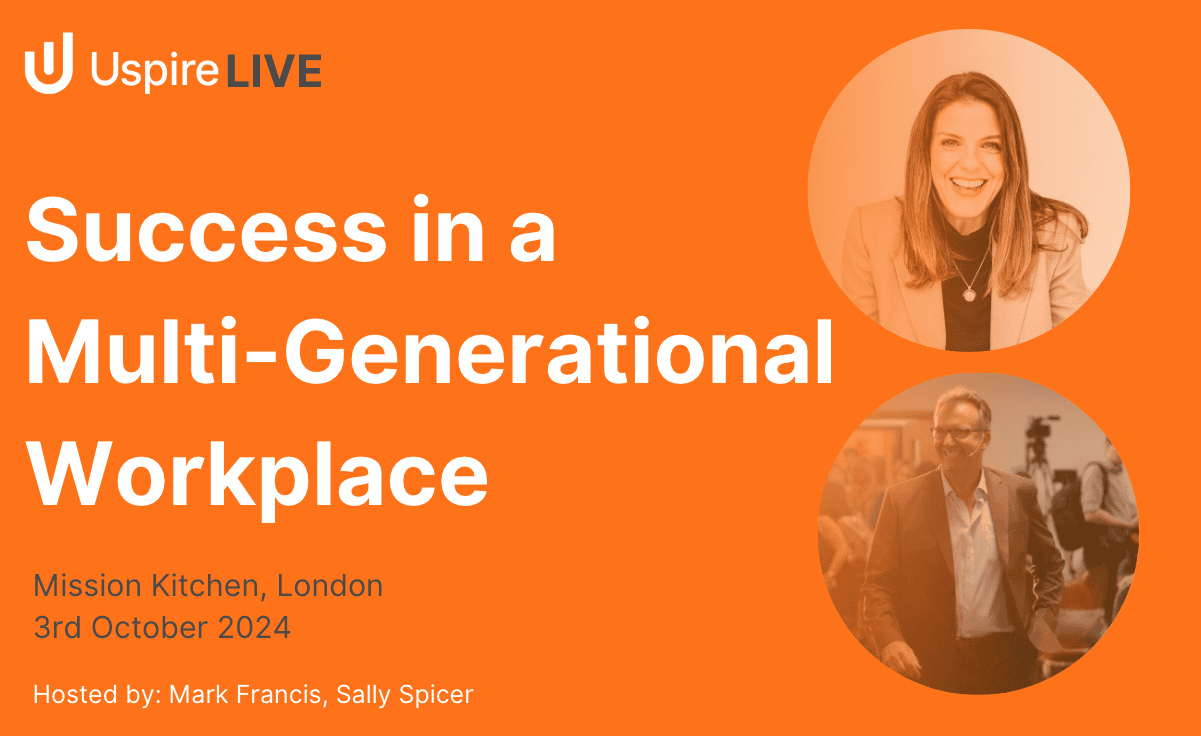
Uspire LIVE 3rd October 2024 - Sally Spicer Session 1 - Bias & Impact
Mark Francis, Uspire's Director of Learning hosted Uspire LIVE and welcomed Sally Spicer of Talent Included to debate the recipe for success in a multi-generational workplace.
Navigating Multigenerational Teams for Business Success
In today’s dynamic workplace, effective leadership goes beyond managing individuals—it involves bridging generational gaps to create harmony and drive performance. Our guest speaker at Uspire LIVE, Sally Spicer, with 25 years of experience in recruitment, has seen the evolution of leadership, workplace dynamics, and diversity first-hand. Her insights highlight how understanding the psychology behind career decisions, fostering inclusion, and managing diverse teams is key to modern business success.
The Power of Inclusion
At the heart of Sally’s career is a passion for driving business performance through people. Diversity and inclusion are not just buzzwords; they are crucial elements in nurturing innovation and productivity. For businesses to thrive, they need to ensure all team members feel included and that their unique contributions are valued.
“Inclusion is about belonging” - and as Sally highlights, businesses need to build environments where individuals, regardless of their background or demographic, can flourish. This means creating spaces where differences in thought, experience, and skills are harnessed for innovation. Ultimately, diverse perspectives drive better decision-making, problem-solving, and creativity, fostering an inclusive workplace culture that benefits both employees and the organisation.
Generational Dynamics in the Workplace
One of the biggest challenges facing leaders today is managing the expectations of different generations. The various generational cohorts have very different characteristics—Silent Generation, Baby Boomers, Generation X, Millennials, and Gen Z—offering a fresh perspective on how these groups impact workplace dynamics. Each generation brings its strengths, but also certain challenges.
The Silent Generation values structure and loyalty, while Baby Boomers are hardworking but may resist new technologies.
Generation X bridges the gap between Baby Boomers and Millennials, with a balanced approach to work but can be skeptical of authority.
Millennials, on the other hand, are tech-savvy and value flexibility, often perceived as impatient for career advancement.
Finally, Gen Z, the digital natives, bring a fresh wave of technological prowess and a strong demand for purpose and inclusion in the workplace.
Leveraging Generational Strengths for Team Success
Rather than viewing these differences as obstacles, leaders are encouraged to recognize the strengths of each generation. For example, the Baby Boomers' loyalty can provide stability, while Millennials' tech-savvy approach can drive innovation. Understanding these traits allows leaders to foster collaboration between generations, building more cohesive teams.
Equity in the workplace is key. It's not enough to hire diverse talent; organizations must create equitable environments where every individual, regardless of age or background, has the opportunity to succeed. This approach, which emphasises inclusion over tokenism, helps retain talent and ultimately drives long-term business success.
Adapting Leadership Styles to Meet Modern Needs
Leaders need to evolve to meet the demands of today’s workforce. Traditional leadership styles, which focus on top-down authority and rigid structures, no longer work in environments where flexibility and autonomy are prized. Modern leaders must learn to adapt, encouraging more open communication, fostering collaborative decision-making, and providing the support needed for employees to thrive in a flexible, hybrid work environment.
With Gen Z entering the workforce in droves, organisations that fail to offer purpose-driven work environments may struggle to attract and retain top talent. Gen Z is particularly interested in companies that prioritise social impact and inclusivity, aligning their work with broader societal goals. Organisations that adopt these principles will be better positioned to engage and inspire the next generation of leaders.
Embracing Diversity for Competitive Advantage
Sally concludes with a call to action for businesses to see diversity and inclusion as a competitive advantage rather than a challenge. Multi-generational teams, when managed effectively, can enhance creativity and innovation. By understanding the unique needs and strengths of different generations, leaders can build teams that are more engaged, motivated, and aligned with the organization’s goals.
In today’s fast-changing business landscape, those who fail to adapt risk being left behind. To remain competitive, organisations must not only embrace diversity but also create inclusive environments that allow every individual to bring their best to the table.
Watch the full session below:
Build a leadership plan for your multi-generational teams with Uspire. Co-created training programs and Academies are available to support your leadership team in getting the best from your people.
Contact Mark Francis or Andy Smith